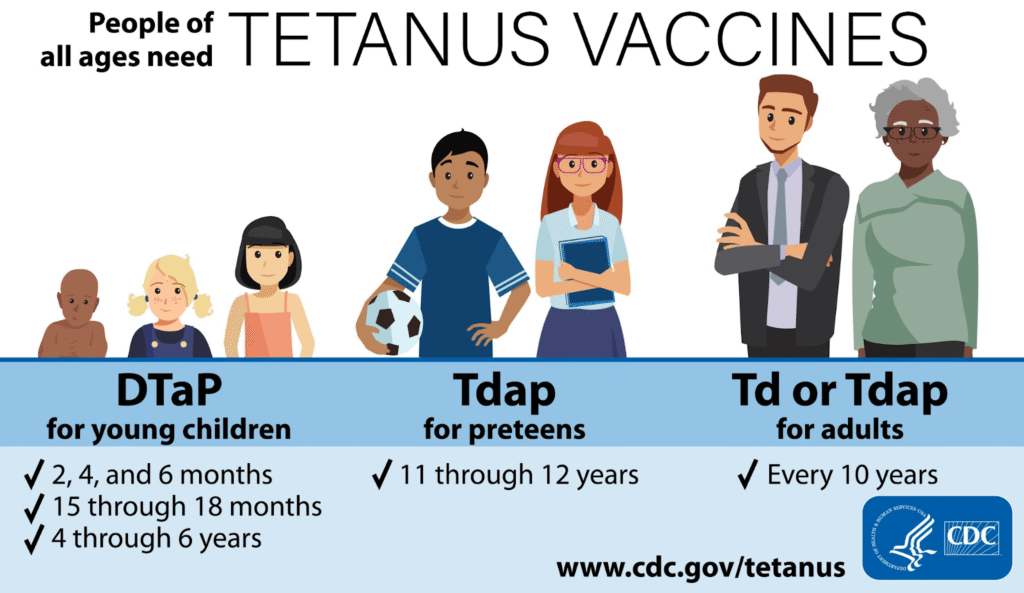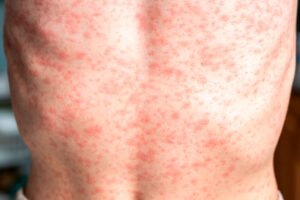
Tetanus is an infection caused by bacteria called Clostridium tetani (C. tetani), that are found in the environment. Tetanus is an uncommon but very serious disease that requires immediate treatment in a hospital.
Where Tetanus Spores Are Found
Tetanus spores are widespread in the environment. They are commonly found on rusty tools such as nails, needles, barbed wire, knives, and farm equipment. Spores also exist in soil, ashes, animal and human intestines and feces, and even on skin. These spores are highly resistant to heat and many antiseptics, allowing them to survive for years.
How Tetanus Spreads
The infection occurs when spores enter the body through a wound or cut that comes into contact with contaminated material. The incubation period ranges from 3 to 21 days, but symptoms can appear within a day or take several months to develop.
Types of Tetanus
There are four main clinical forms of tetanus:
- Local tetanus – limited to the site of the injury.
- Cephalic tetanus – linked to head trauma or infections.
- Generalized tetanus – the most common form, responsible for about 80% of cases.
- Neonatal tetanus – occurs in newborns (within 28 days), usually through infection of the umbilical stump.
Symptoms
The first signs are often sudden muscle cramps and contractions, starting in the neck and face. Jaw stiffness, or trismus, is so characteristic that tetanus is sometimes referred to by this name.
Other symptoms may include:
- Headache
- Difficulty swallowing
- Seizures (violent shaking or jerking of the body)
- Fever and sweating
- High blood pressure
- Rapid heart rate
- Pneumonia
- Fractures caused by severe muscle spasms
- Nerve or brain damage in infants and children
If untreated, tetanus can progress quickly, causing breathing difficulties as muscle stiffness spreads to the chest. The disease can be fatal in 10–20% of cases.
Who Is at Risk?
Tetanus can affect people of all ages and occurs worldwide. Infants and the elderly are particularly vulnerable. Older adults may be unaware that their protection has decreased if they have not received booster shots, making everyday activities like gardening risky.
Treatment
Tetanus is a medical emergency and requires hospital care. Treatment includes:
- Immediate administration of human tetanus immune globulin (TIG)
- Aggressive wound cleaning
- Antibiotics
- Medications to control muscle spasms
- Supportive care
- Tetanus vaccination
Even after recovery, patients do not develop natural immunity and must be immunized to remain protected.
Prevention
Tetanus is entirely preventable through vaccination with tetanus toxoid-containing vaccines (TTCV), which are part of routine immunization programs worldwide and are also given during prenatal care.

Infants and Children
The vaccine is safe, effective, and free. It is given as part of a combination vaccine that protects against five diseases, with doses at:
- 2 months
- 4 months
- 6 months
- 18 months
Mild side effects may include:
- Redness or soreness at the injection site
- Irritability
- Drowsiness
- Loss of appetite
- Low fever
These typically appear 12–24 hours after vaccination and resolve within a few days.
Children receive a booster dose between ages 4 and 6, and another between ages 14 and 16.
Adults
Adults should receive a tetanus booster every 10 years to maintain protection.
Tetanus in Canada
Thanks to widespread vaccination, tetanus is now very rare in Canada. Mortality rates have dropped nearly to zero, with only five deaths recorded since 1980—the last in 1997.
The best way to prevent tetanus is vaccination.
Sources:
https://www.cdc.gov/vaccines/imz-schedules/adult-easyread.html




